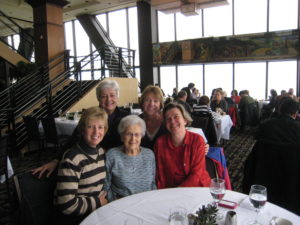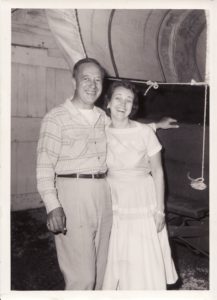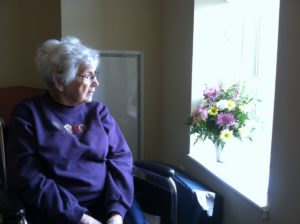Reflections On My Mother, My Disability, and What She Taught Me
by Beth

Flo and her daughters in the Hancock building for her 95th birthday
Knowing that every parent wants their children to grow up healthy and happy, it dawns on me now that it must have been hard on my mother (I called her by her first name, Flo) to take it all in when I lost my sight. I was 26 years old then. She was 69, and she never let on that she was sad about my new disability or that she worried for me. She encouraged me instead, told me how proud she was of me and how sure she was I’d continue living an interesting –and pleasurable –life.
Our father had a fatal heart attack at home when I was three. Flo raised us on her own. Sometimes when she happen to drive by the funeral home I’d call out, “That’s where Daddy lives!” She never corrected me.

Flo and husband Eddie (Beth’s dad) before he died
Our dad had switched jobs shortly before his death and had no life insurance. Flo got Social Security, but it wasn’t much. She found a job, and it was during her first summer working that I was diagnosed with Type 1 diabetes. I was hospitalized for two weeks, and Flo couldn’t miss work, but every morning and evening she’d stop to see me on her commute. At night she’d leave the hospital early enough to have dinner at home with my sisters Beverly and Marilee. Our older brothers and sisters were all married or out working, so Flo, Marilee, Bev, and I took care of the house, mowed, cleaned out the gutters, did makeshift repairs. The older kids contributed money from their paychecks, Marilee cooked for us, and on Thursday nights — before Flo’s weekly payday — we often ate what was left in the refrigerator, usually toast and eggs. But dinner was always ready when Flo got home, we never went hungry, and we lived what we considered happy, normal lives.

Beth and her older sisters celebrating Flo’s 93rd birthday with her. From the top (of the stairs) that’s Bobbie, Bev, Cheryl, Marilee, Beth, and of course Flo.
Flo never complained about things being hard or unfair. She did complain when we didn’t do our chores or if we fought over dishwashing duty or messed up what she’d just finished cleaning. But she never told us we were a burden or that we’d worn her out, though plenty of evenings she just went to her room and lay down. When we went in to ask if anything was wrong, she’d say, “No, I’m just resting my eyes.”
Years later, after losing my sight, I was visiting our son’s classroom and another young mother struck up a conversation with me. Eventually we got around to what my family had been like when I was growing up. “Oh, so that’s where you get it,” she said after I described Flo.
“Get what?”
“Your courage,” she answered.
I was flattered but had to chuckle. Flo would have been embarrassed. She didn’t believe she was being courageous. She saw her life in simple terms: she did what she had to do. And I realized that I look at my own life that way.

Flo when she was in assisted living in her 90s.
Flo could have never known I would someday lose my sight, but her work ethic, her determination not to complain, her perseverance and her appreciation for those around her served as the perfect role model for her children, especially for the daughter who is writing this blog post.
No one can predict what will happen to their children, but giving them a first-hand look at hard work, determination and love can sure help brace them for whatever comes their way later. Flo died a few years ago, but her spirit lives on. I write this Mother’s Day post in her honor. I was lucky to have her.
More posts about motherhood:






